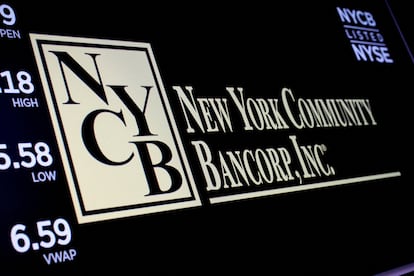Embattled New York Community Bancorp gets $1 billion cash infusion, adds Steven Mnuchin to its board
The stock had tumbled 42% to $1.86 earlier Wednesday, before its trading was halted in the afternoon, pending news

Embattled New York Community Bancorp announced a lifeline of more than $1 billion from a group of investors on Wednesday, after seeing its stock plunge by more than 80% this year.
Shares of the bank, has which has been hammered by weakness in commercial real estate and growing pains caused the recent buyout of another distressed bank, were sent on a wild ride. New York Community Bancorp lost nearly half of its market value Wednesday on rumors that it was seeking cash, then jumped toward its best day in nearly a year on news of the capital infusion, then quickly gave up all those gains.
The deal will bring four new directors to NYCB’s board, including Steven Mnuchin, the former U.S. Treasury secretary under President Donald Trump. Joseph Otting, a former comptroller of the currency, will become the bank’s CEO.
Under the deal, which the bank said still needs “finalization of definitive documentation” and regulatory approvals, the bank would get investments of $450 million from Mnuchin’s Liberty Strategic Capital, $250 million from Hudson Bay Capital and $200 million from Reverence Capital. Cash from other institutional investors and some of the bank’s managers will take the total over $1 billion, the banks aid.
The investors will receive stock in the company valued at $2 per share, along with convertible preferred stock that could pay dividends every three months.
The stock had tumbled 42% to $1.86 earlier Wednesday, before its trading was halted in the afternoon, pending news. A report from The Wall Street Journal earlier in the day had said the lender was considering raising cash through the sale of stock in order to shore up confidence in it.
After news of the $1 billion investment NYCB’s stock immediately erased those losses and jumped 18%, which would have been its best day since March 20. But the stock gave up the gains and then swiveled between losses and gains. It was up 4.3%, with a little less than an hour remaining before the closing bell.
Stocks of other regional banks, which have been caught up in the same anxieties that have afflicted NYCB, also wobbled. An index of regional bank stocks went from a loss of 3.1% before the announcement to a slight gain and back to a loss of 0.1%.
NYCB was a relatively unknown bank until last year, when it bought the assets of Signature Bank at auction on March 19 for $2.7 billion. Signature was one two banks crumbled in last year’s mini-crisis for the industry, where bank runs also sped the collapse of Silicon Valley Bank.
The sudden increase in size for NYCB meant it had to face increased regulatory scrutiny. That’s been one of the challenges for the bank, which is trying to reassure depositors and investors that it can digest the purchase of Signature Bank while dealing with a struggling real-estate portfolio.
NYCB said last week that it had found significant weakness in how it internally reviews loans, caused by ineffective oversight, risk assessment and monitoring activities. That caused it to delay filing its annual report and report a bigger loss for the latest quarter. It also replaced its longtime chief executive officer.
Pressure rose further on the bank after credit agencies cut NYCB’s rating.
Industry analysts still say NYCB’s troubles appear unique to the bank and downplayed the risk of contagion in the banking sector.
“It’s very interesting that they ended up being an amalgamation of a few bank acquisitions that seems to just not worked out,” said Chris Caulfield, a banking industry consultant and analyst with West Monroe, who focuses on mid sized banks.
But weakness in commercial real estate is a looming challenge for all kinds of banks, as changes in how people work following the pandemic leave many office buildings with more vacancies.
Sign up for our weekly newsletter to get more English-language news coverage from EL PAÍS USA Edition
Tu suscripción se está usando en otro dispositivo
¿Quieres añadir otro usuario a tu suscripción?
Si continúas leyendo en este dispositivo, no se podrá leer en el otro.
FlechaTu suscripción se está usando en otro dispositivo y solo puedes acceder a EL PAÍS desde un dispositivo a la vez.
Si quieres compartir tu cuenta, cambia tu suscripción a la modalidad Premium, así podrás añadir otro usuario. Cada uno accederá con su propia cuenta de email, lo que os permitirá personalizar vuestra experiencia en EL PAÍS.
¿Tienes una suscripción de empresa? Accede aquí para contratar más cuentas.
En el caso de no saber quién está usando tu cuenta, te recomendamos cambiar tu contraseña aquí.
Si decides continuar compartiendo tu cuenta, este mensaje se mostrará en tu dispositivo y en el de la otra persona que está usando tu cuenta de forma indefinida, afectando a tu experiencia de lectura. Puedes consultar aquí los términos y condiciones de la suscripción digital.








































